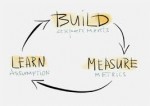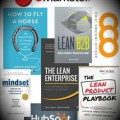Eric Ries wrote Lean Startup: How Today’s Entrepreneurs Use Continuous Innovation to Create Radically Successful Business in 2011 and sparked an entire movement. Lean Startup is a methodology or, some may even say, a philosophy based on ideas from lean manufacturing and agile product development. Ideas such as minimizing waste through small batches, getting to market quickly and ensuring that all tasks accomplished in a company must benefit the customers.
Although the author’s experiences that led to Lean Startup are mostly in software start-ups, the concepts can be applied to organizations of all sizes in all sectors. If you haven’t read it attentively yet I strongly urge you to. It is one of the most pertinent and content rich books I’ve read in a long while.
The Good
It’s easy enough to understand the concepts. You build a minimum viable product (MVP), the equivalent of the small batch in lean manufacturing. You send it out to market quickly using agile development techniques. You measure how well it does with metrics that are actionable, accessible and auditable. You learn from the information you just gathered. You adjust your aim or you change your entire strategy (pivoting) if necessary. Then you start the cycle again aiming for the perfect product/market fit.
It will get your start-up to be profitable faster. You won’t be spending a year or two developing a product that the market has zero or not enough interest in to make it profitable.
It also promotes the idea that rigorous management, based on a sound dashboard, is a winning strategy. So many start-ups, managed solely on instincts, go round in circles and waste resources.
It makes implicit the notion that companies, products and strategies are not set in stone but fluid. The Lean Startup model pushes everyone in the organization to adapt constantly.
This type of agile, efficient and adaptable model is what is needed to answer the demands of today’s fast changing markets where customers and consumers hold the bigger end of the stick.
The Bad
Although the concept is easy to understand, putting it into practice is difficult, very difficult.
Figuring out what exactly is a minimum viable product when you are still not sure of what the market wants is not a science, it’s an art. Hence you need market artists that have a ‘’sense’’ of what the market wants. You do not want to spend precious time over developing your product nor delivering such a shoddy one that you kill your reputation before your company even takes off.
Figuring out which metrics to use for your learning curve and how to translate them into the right questions to ask is not easy but it’s doable. Finding potential target customers in large enough numbers, at every iteration of your product, to give you their feedback is pretty much mission impossible for most start-ups. Hence you need a budget (a hefty one at that) to outsource this part if you want to do it right.
Learning is easy enough for most people. Adapting to an Nth change of strategy (pivoting) within a short period is not, especially if you are part of a team. The larger the team, the harder it is to change your strategy. Unless you are equipped to deal with the strong emotional reactions significant pivoting generates you could, at best, damage morale and at worst lose key players.
The Ugly
The Lean Startup model may give the impression that anyone can be an entrepreneur and pump out an AirBnB or Uber. The reality is very different. Starting a company from scratch is not as easy as following a 1-2-3 recipe. It requires certain aptitudes and predispositions that most people don’t have. Ask any seasoned venture capitalist. They will tell you that, once the basics are covered, what they look for they find in their interactions with the entrepreneurs themselves. Entrepreneurs have a certain attitude that VCs can spot a mile away.
Finally, and this is a point that Eric Ries himself mentions, is the tendency most of us have to, for the sake of doing things quickly, apply a proven recipe without understanding its goals and where it stems from. Applying the build-measure- learn model or developing a MVP without understanding the basic ideology behind lean is a great recipe for failure. As illustrated by some critics of Lean Startup forecasting that the world is about to witness an onset of defective products stemming from start-ups launching their minimum viable products.
Lean Startup is not a magical recipe that, if applied rigorously, will yield successful start-ups without fail. Like any other methodology, using it blindly without proper questioning, perspective or adapting it to your environment, is never a good idea. Lean Startup is, however, a flexible experience-based methodology adapted to today’s market realities that will definitely increase the chances of success of any project.











